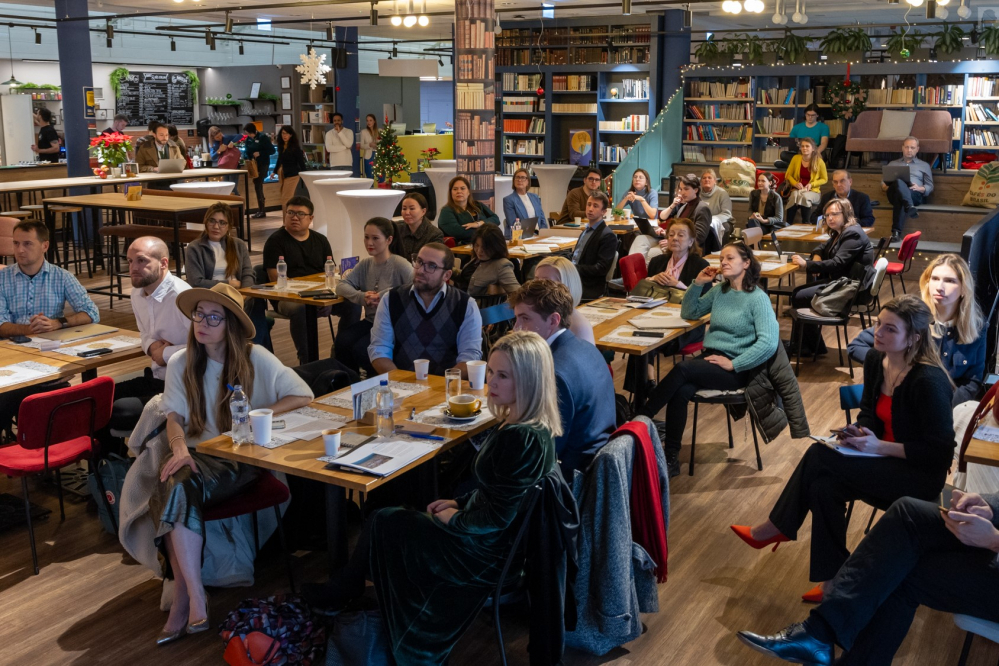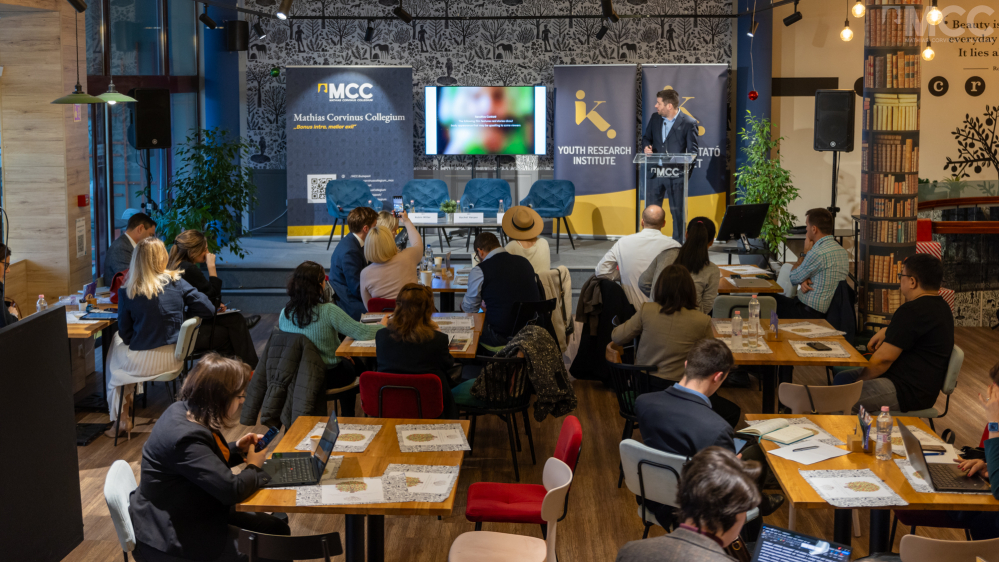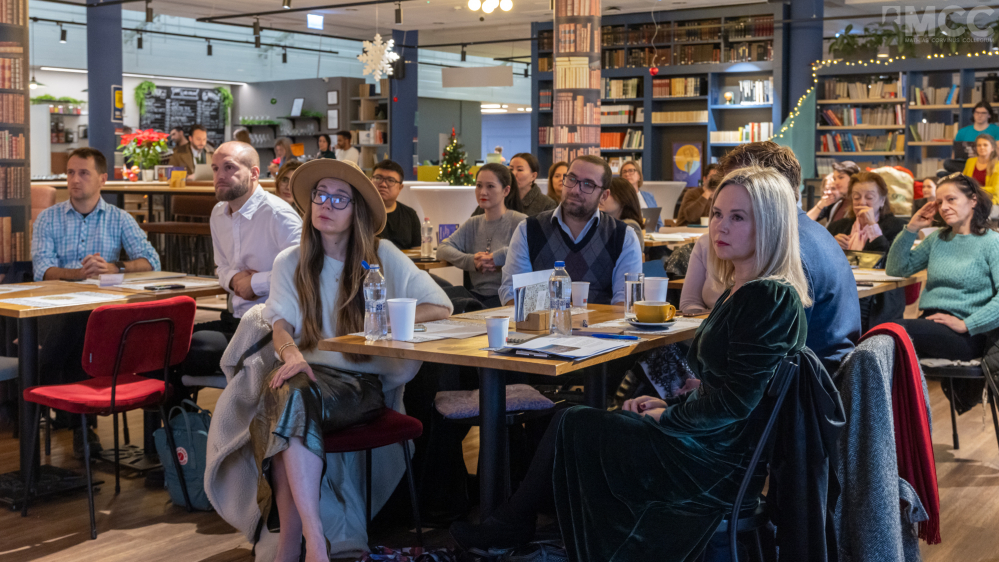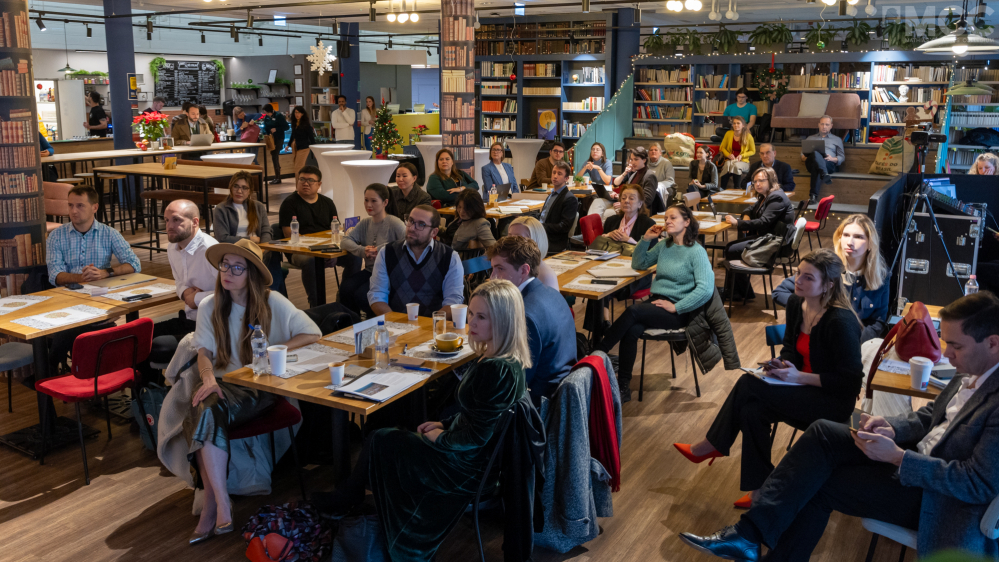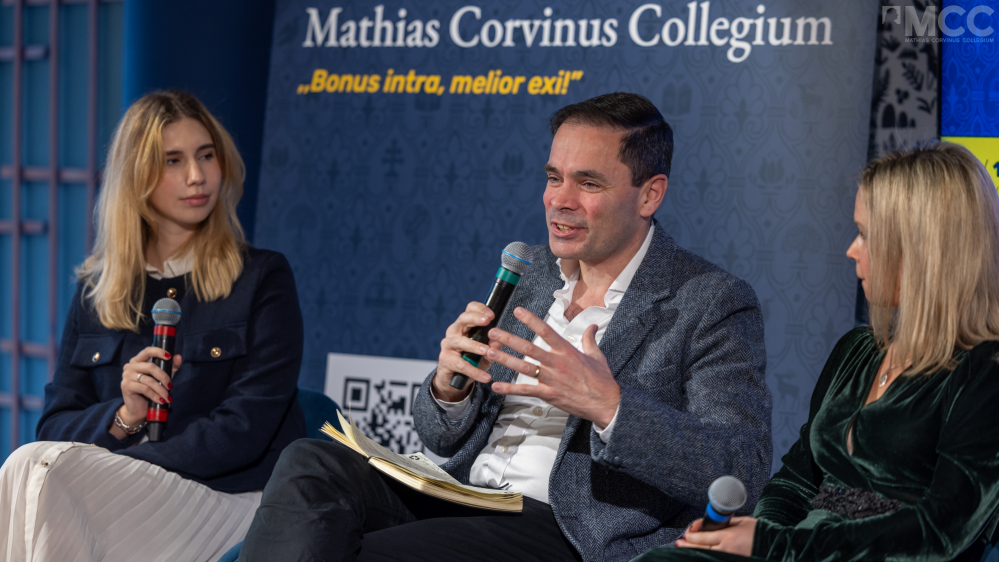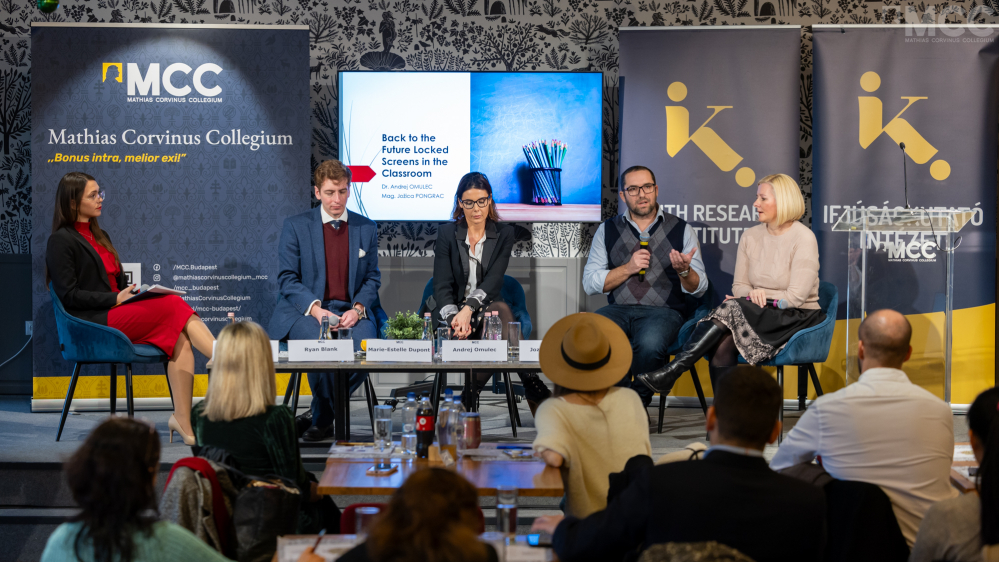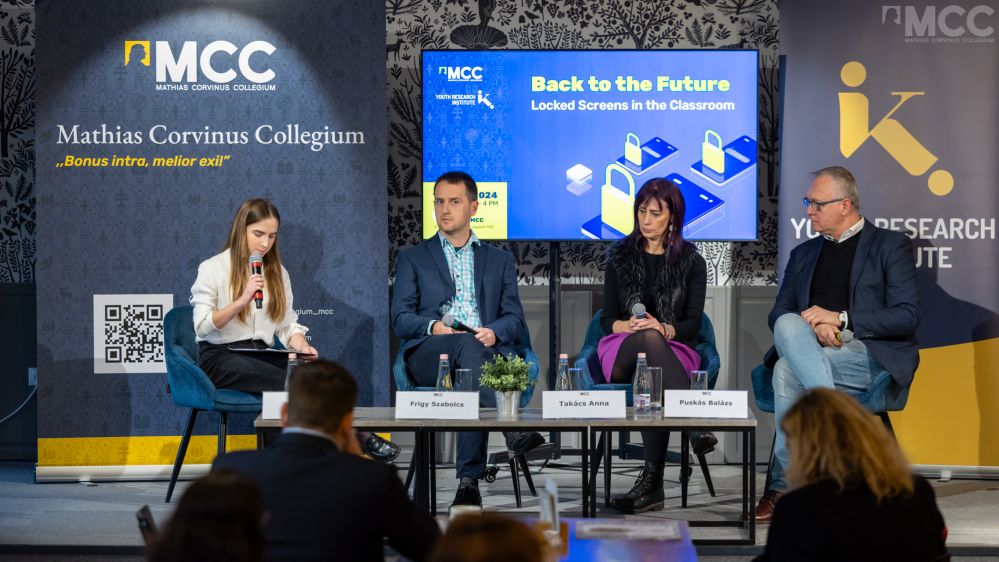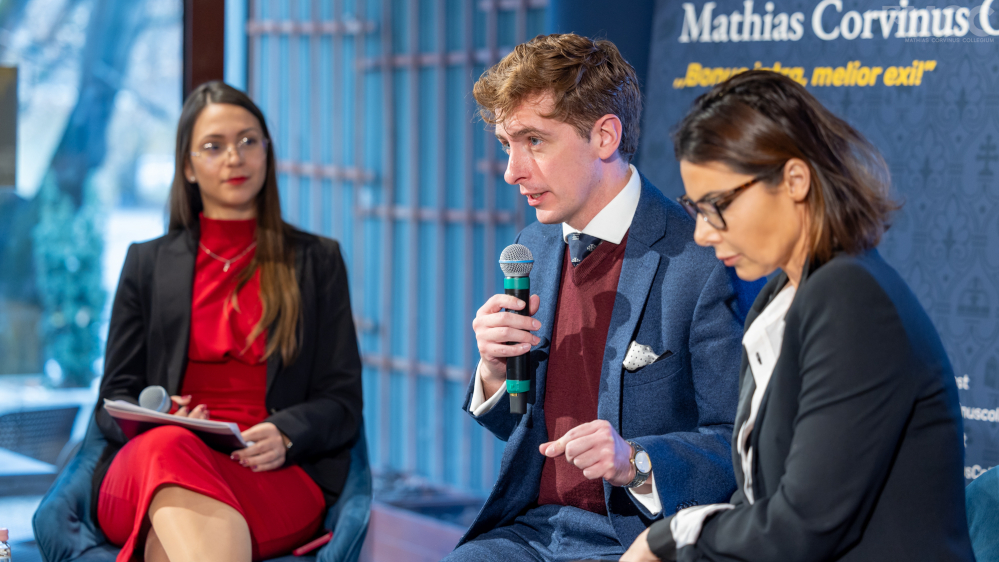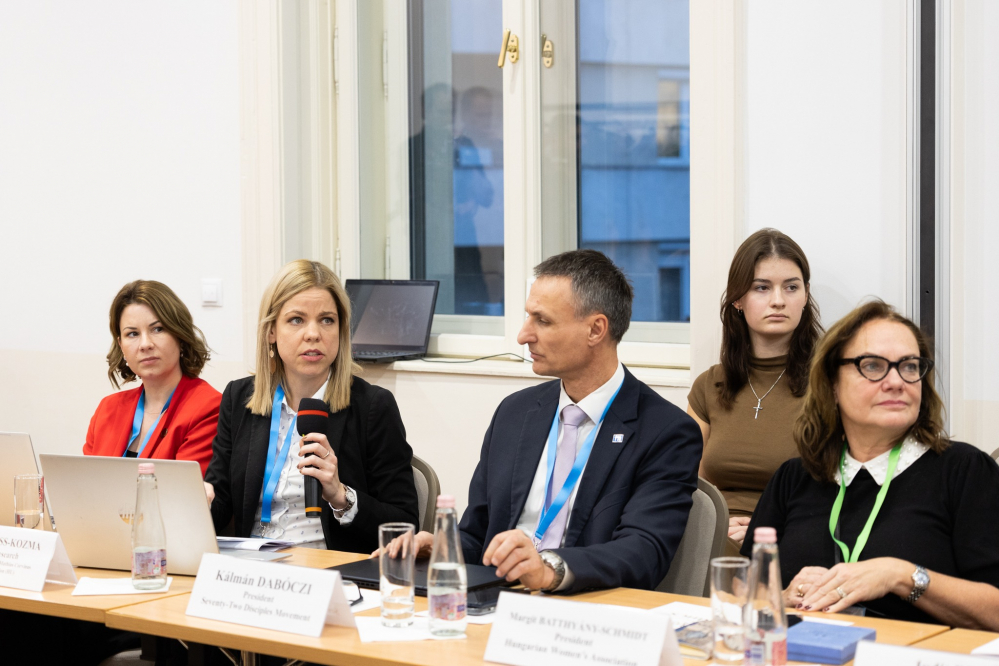The Youth Research Institute hosted an international conference on the restriction, regulation, and banning of smartphones in schools entitled “Back to the Future – Locked Screens in the Classroom”.
Ákos Pöltl, a family security expert and senior researcher at the Youth Research Institute, opened the conference with an insightful presentation on his mission and professional work. He emphasized the profound and pervasive impact of mobile phones on young people, noting how these devices can dominate their lives, hinder learning, harm mental health, and undermine parental supervision. Pöltl stressed the importance of international collaboration—such as the efforts represented by this conference—in developing effective strategies to regulate, control, and, where necessary, ban smartphones from schools to protect and support the well-being of students.
Following Ákos Pöltl’s introductory statements and presentation, Rachel Harper, head of the “It Takes a Village” initiative and principal at an Irish primary school shed light on the formation, status and goals of her movement that she leads. “It Takes a Village” is a community-driven program aimed at improving the well-being of primary school children. It addresses rising anxiety levels among students by fostering digital awareness and emotional skills among children, parents, and teachers. Led by Principal Rachel Harper in collaboration with 8 local schools in her district, the initiative emphasizes collective action over individual responsibility, involving workshops, a voluntary no-mobile device code, and the recruitment of play therapists. It focuses on inclusivity, collaboration, and advocacy to support children's mental health and resilience.
The panel titled “The Changing Education Environment: Regulations, Perspectives, and Experiences from the UK, Ireland, Hungary, and Slovakia” brought together a distinguished group of speakers to explore the evolving landscape of education across these nations. Rachel Harper, Principal at St. Patrick's National School in Ireland and spokesperson for the ‘It Takes a Village’ youth wellbeing initiative, joined this panel after her presentation to share her insights into fostering community-driven education. She highlighted the need for these restrictions to be volunteer-based because this is the best way to get parents on board, as oftentimes, they end up encouraging each other to maintain a smartphone-free community. Robin Millar, former Member of Parliament for North Wales, provided a policy-oriented perspective rooted in his extensive experience in governance. He emphasized the importance of preserving parental rights and the sanctity of the family in the face of government regulation as well as the online community. Michal Bozik, a researcher from the Research Institute of Child Psychology and Pathopsychology and advisor for the Slovak Ministry of Education, offered a practical view on how these policies are implemented as he played an essential role in enacting school-smartphone bans in Slovakia. The discussion was expertly moderated by Dorina Marton, a law student at the MCC School of Law.
The panel “Navigating Young Minds and Mobiles: The Impact on Students' Wellbeing, Mental State, and Learning Capabilities” brought together experts from diverse fields to explore the complex relationship between youth, technology, and education. Maire-Estelle Dupont, a clinical psychologist, shed light on the psychological effects of mobile device use on young people. One of her most memorable pieces of advice for parents was not to allow their child a smartphone before they can properly hold a pencil; alongside the psychological harm extensive screentime can cause, she also spoke in depth on the damage it does to sensory-motor development in children. Andrej Omulec, a lecturer at the School of Advanced Social Studies at the University of Nova Gorica, provided a sociological perspective on the influence of technology in educational settings. He brought up the faulty reasoning many parents have for providing their children with tech too early-on: oftentimes they are convinced or even manipulated to an extent by their own child. However, it is the responsibility of the parent to see through this reasoning and make the healthy and secure decision to either delay personal devices or severely restrict screentime. Jozica Pongrac, a family and marital therapist with an interest in youth and technology, shared her scientific-based argument on delaying smartphone usage: according to her diagrams and studies, the brain only fully develops at the age of 25. Thus, the damage to learning capabilities and mental health that an overdose of digital exposure can cause is much more relevant at the younger ages. Ryan Blank, Head of Politics at the Harrow School in London, brought an educational and practical context to the discussion. He revealed that in his teaching methods, he breaks up lessons into less than ten-minute sections to keep students engaged; though this can pose a challenge from the teacher’s side, it is possible to adapt to students’ attention spans as long as they do not abuse their smartphone use at home. Moreover, he underscored the need for teachers to assign as little homework as possible that is screen-based as this can add hours to a child’s daily screentime. The panel was moderated by Enikő Szakos, a senior researcher at the MCC Learning Institute, who facilitated a thoughtful dialogue on these pressing issues.
The panel discussion “Regulation in Education: Balancing Technology, Rights, and Safety in Schools” featured the following participants: Balázs Puskás, Director General of the Váci Diocese Catholic Schools Authority; Szabolcs Frigy, Head of Education and Lecturer at Babeș-Bolyai University; László Tóth, Head of the Crime Prevention Division at the Zala County Police Department; and Luca Bártol, a student at the MCC School of Law, who moderated the panel. The discussion focused on the regulatory and safety challenges posed by the presence of digital devices in schools. The participants highlighted that young people are often left to face the dangers of the digital world on their own, which can lead to issues such as bullying, phishing, and serious crimes like child pornography. The topic of equality was also discussed, emphasizing how many students are marginalized or bullied because they do not possess the latest or most fashionable technological devices. The panel emphasized the importance of cooperation between parents and schools in limiting screen time and the need for institutional collaboration. The participants underlined that regulating the use of digital devices in schools can help improve students' physical and social skills while mitigating the harmful effects of excessive technology use.
The panel discussion “Mental Health, Cognitive Development, and Emotional Intelligence Among Young People” included the following participants: Berci Trauttwein, developer of the OUT application; Melinda Hal, clinical psychologist; Rita Uzsalyné Pécsi, educator and education researcher; Szilárd Horváth, founder of the Búzaszem School and employee of MTVA; and moderator Ákos Pöltl, research expert at the Youth Research Institute. The discussion addressed the impact of excessive mobile phone use on mental health, with particular emphasis on how digital devices overshadow social life and the ‘real’ experiences essential for the development of young people. According to the participants, children’s nervous systems develop best through active movement, artistic activities, and real human connections, rather than through digital content. They also highlighted that parents’ mobile usage habits influence their children, making it essential to restrict screen time not only in schools but also at home. The phenomenon of “digital autism,” which refers to developmental disorders in young people caused by excessive device use, was also discussed. Proposed solutions included introducing mobile phones at a later age and minimizing their use.
The event concluded with a closing speech by Levente Székely, Director of the Youth Research Institute. The entire conference is available for viewing on the Institute's YouTube channel.

